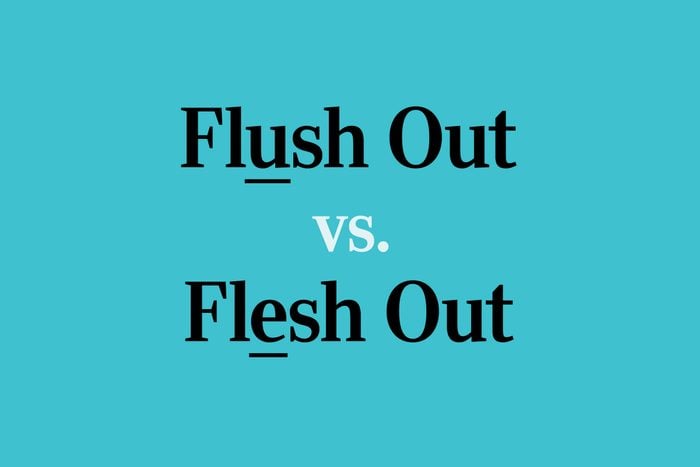“Flush Out” or “Flesh Out”: Which Is Correct?
Updated: Mar. 30, 2023

Time to flesh out the difference between these common phrases. Or should we say "flush out"?
There are a lot of confusing grammar rules out there. So many, in fact, that it can be hard to keep up. Do you know the difference between lay vs. lie? OK vs. okay? All of a sudden vs. all of the sudden? “Burnt vs. burned“? You may have been using these words and phrases incorrectly all this time without even knowing it. Before you make any drastic changes—or flush out your old grammar habits—let’s flesh out the difference between “flush out” and “flesh out.” Confused? You’ve come to the right place.
What does “flush out” mean?
“Flush out” means to force something out of a small place, most typically used regarding cleaning. Imagine forcing something through a container, like how water travels when you flush a toilet. But besides talking about human waste in the restroom, “flush out” is commonly used surrounding crime—as in, flushing out the enemy. The idiom originates from bird hunting, where another animal can get birds to come out of hiding. But you likely won’t be discussing hunting when you want to use the phrase.
Here are just a few examples of how you can use it properly now.
- The NYPD is looking to flush out thieves who pickpocket tourists on the subway.
- Park rangers are trying to flush out bears from the area so people can camp safely.
- I can tell my cousin is lying, so I want to flush out his untruths to figure out what’s really going on.
What are some synonyms for “flush out”?
Instead of saying you want to flush something out, you could say you would like to clear something away or clear something out. Or you could say you want to make a clean sweep.
Keep the learning going and make sure you’re using affect vs. effect correctly.
What does “flesh out” mean?
“Flesh out” means to expand on an idea, provide more of an explanation, or make something more complete. You may need to flesh out some last-minute details, flesh out your outline, or flesh out your project. Think about using this phrase when you need to add a little more substance to an idea or assignment. For more of a visualization, imagine adding flesh to a skeleton. You’re adding to the bones to make the final skeleton more complete.
There are a handful of ways you can use it in a sentence, but here are a few examples.
- Let’s flesh out this marketing strategy in our next meeting.
- The musician fleshed out his acoustic tracks by adding some bass and drums.
- In her speech, she fleshed out her idea for a new health care policy.
What are some synonyms for “flesh out”?
If you’re looking to clarify what you mean when you say you want to flesh something out, you could also say expand, enlarge, or expound upon. You really could use any type of word or phrase that indicates growth or expansion.
Make sure you also know the difference between grey and gray before your next spelling bee.
Should you use “flush out” or “flesh out”?
Use “flush out” when you want to remove something and “flesh out” when you want to expand on something. Remember, “flush out” is like flushing a toilet to get rid of the waste. “Flesh out” is like adding flesh to a skeleton or making something fuller.
Now that you know whether to use “flush out” or “flesh out,” learn the difference between another set of confusing words: bald-faced vs. bold faced.
Sources:
- Merriam-Webster: “Should You ‘Flush Out’ or ‘Flesh Out’ Your Plan?”
- Grammarist: “Flesh out vs. flush out”
- The Free Dictionary: “Flush out the bird”



